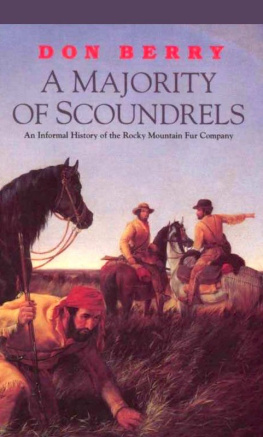Don Berry - A Majority of Scoundrels: An Informal History of the Rocky Mountain Fur Company
Here you can read online Don Berry - A Majority of Scoundrels: An Informal History of the Rocky Mountain Fur Company full text of the book (entire story) in english for free. Download pdf and epub, get meaning, cover and reviews about this ebook. year: 2006, publisher: Oregon State University Press, genre: Non-fiction. Description of the work, (preface) as well as reviews are available. Best literature library LitArk.com created for fans of good reading and offers a wide selection of genres:
Romance novel
Science fiction
Adventure
Detective
Science
History
Home and family
Prose
Art
Politics
Computer
Non-fiction
Religion
Business
Children
Humor
Choose a favorite category and find really read worthwhile books. Enjoy immersion in the world of imagination, feel the emotions of the characters or learn something new for yourself, make an fascinating discovery.
- Book:A Majority of Scoundrels: An Informal History of the Rocky Mountain Fur Company
- Author:
- Publisher:Oregon State University Press
- Genre:
- Year:2006
- Rating:4 / 5
- Favourites:Add to favourites
- Your mark:
- 80
- 1
- 2
- 3
- 4
- 5
A Majority of Scoundrels: An Informal History of the Rocky Mountain Fur Company: summary, description and annotation
We offer to read an annotation, description, summary or preface (depends on what the author of the book "A Majority of Scoundrels: An Informal History of the Rocky Mountain Fur Company" wrote himself). If you haven't found the necessary information about the book — write in the comments, we will try to find it.
A Majority of Scoundrels: An Informal History of the Rocky Mountain Fur Company — read online for free the complete book (whole text) full work
Below is the text of the book, divided by pages. System saving the place of the last page read, allows you to conveniently read the book "A Majority of Scoundrels: An Informal History of the Rocky Mountain Fur Company" online for free, without having to search again every time where you left off. Put a bookmark, and you can go to the page where you finished reading at any time.
Font size:
Interval:
Bookmark:
A Majority of Scoundrels
An Informal History
of the Rocky Mountain
Fur Company
Don Berry
To David/ Bonnie/ Duncan
ASHLEY AND HIS MEN 1822-1826
SMITH JACKSON & SUBLETTE 1826-1830
THE ROCKY MOUNTAIN FUR COMPANY 1830-1834
Authors Preface
An early NorthwesternerIve forgotten who it wasonce took a hard look at his own journal and put down his considered opinion that it was ill wrote worse worded and not well spelt.
I dont know how many gloomy hours Ive spent contemplating that honest admission. A good many, I think, because long ago I came to feel a profound sense of kinship with that clear-sighted gentleman. He knew what he was about; this is the invariable impression given by that first terrifying look at the completed work. At times like that one regrets the passing of the old, engaging sort of that began Gentle Reader It amounted simply to a plea for tolerance; be kind, it said, and forgive my transgressions; all errors herein proceed from a natural feebleness of mind for which I am not responsible. If there is a writer who doesnt feel the need for some such appeal to the reader, hes a braver man than I; and I hereby enter my offcial plea.
The bones and muscle of this book are the direct quotations from the original sources. I have merely supplied a little connective tissue, hoping to make the parts hang together more securely. In the process Ive amused myself by speculating on one aspect or another of the fur trade and have set down the fruits, such as they are, of that speculation. This may deserve a bit of explanation.
There is one principal difference between the amateur of history (which I am) and the professional historian. Not, I hope, in competence; the day is long past when inadequate research might be excused, and we are well rid of it. The difference is in the matter of opinions. The amateur can afford to have them. Too often the academician has to endure the sidelong glances of his confreres if he expresses his own notions in language insufficiently academic, whereas I have cheerfully set down whatever happened to catch my fancy without making much attempt to phrase these personal observations in formal terms.
This, of course, gives the book a somewhat conversational tone, and if anyone is offended by the lack of dignity herein he has my regrets, and I wish him better luck elsewhere. Doubtless a good many of these hard-gained opinions are quite wrong; but all surmise is so labeled and shouldnt cause any confusion. For my errors I apologize, and invite the reader to form his own judgments from the facts as given. If the quotations seem to indicate conclusions different from my own, their evidence is much to be preferred.
The facts themselves may be dependent upon; every statement of fact in the book is documented. Where data has been newly plowed up in my own research, Ive generally quoted the pertinent papers at sufficient length to demonstrate my point. This is also true on those occasions when Ive been forced to differ from what has been written about the trade previously. The reader should not by any means take my comments on other historical opinions as disparaging to them; Ive simply pointing out the places where I have had to depart from the traditional view. In all cases these departures were necessitated by a body of evidence I could not ignore.
PART ONE
ASHLEY AND HIS MEN
1822-1826
"There to be employed
TOEnterprising Young MenThe subscriber wishes to engage ONE HUNDRED MEN, to ascend the river Missouri to its source, there to be employed for one, two, or three years. For particulars enquire of Major Andrew Henry, near the Lead Mines, in the County of Washington, (who will ascend with, and command the party) or to the subscriber at St. Louis.Wm. H. Ashley
GENERAL ASHLEY was a careful man. His advertisement appeared in the Missouri Gazette & Public Advertiser on February 13th, 1822, and began to run in the St. Louis Enquirer two weeks later. Altogether it appeared in St. Louis papers for six weeks running.
By March 27 it had done its work; the general had recruited his men, opened a great era of American history, and ensured the permanence of his own name. He would not have been entirely pleased.
In fact, if someone had been able to tell him he would take his place in history as the author of that advertisement and its results, the good general might well have frowned. It was not that he minded going down in history. Not at all; he was quite prepared for that eventuality. But he had in mind a rather different approach to the matter.
William Ashley was an ambitious man, but the furthest ambition from his mind was to be known as one of Americas great adventurers. The idea was ludicrous on the face of it. Ashley, now in his middle forties, was a man of slight build; his face thin, with a nose generously styled and a projecting chin, His ambitions were coming along nicely, but they had little to do with mountain adventuring. He was already lieutenant governor of the state of Missouri and a brigadier general in the militia. Then, too, there was a gubernatorial election coming up, and who could tell what might happen? Politics was his first love; his other ventures were simply means to that eventual end. Money is, after all, a requisite for even a dedicated office seeker, and the sad fact was that General Ashley needed it badly. One source estimates he was nearly $100,000 in debt. Nathaniel Wyeth, writing eleven years later, says, At the time he [Ashley] engaged in this undertaking he was bankrupt, but was a person of credit, which enabled him to get the requisite means.
A person, of credit covers many of the aspects of General Ashleys career. He was a man of excellent intelligence, and was highly respected. Wherever he went he gravitated into positions of responsibility, inspiring confidence in both his abilities and intentions. If his financial affairs had not gone as he might have wished, it had certainly not diminished the high regard in which he was held.
Most recently Ashley had been in the gunpowder business. When he first arrived in Missouri he had done some little exploring of the back country, armed with a knowledge of surveying and a slight familiarity with geology. He had discovered, among other things, a large cave in Texas County, which was plentifully stocked with potassium nitrate. When the demand for gunpowder increased under the impetus of the War of 1812, Ashley built a complete plant at the cave for the extraction of commercial saltpeter. This he hauled to Potosi, some eighty miles away, where he had built a factory to complete the conversion of the saltpeter into gunpowder.
At Potosi, seventy miles southwest of St. Louis, Ashley probably met his future partner Andrew Henry for the first time. Henry also had been moved to wartime production; he was engaged in lead mining. He had not been actively engaged in the fur trade since 1811, but had kept some financial interest in the Missouri Fur Company. [See Brief Calendar] When the demand for gunpowder and lead subsided after the war, both men withdrew from their businesses. Henryjudging from the famous advertisementremained in residence near Potosi, and Ashley returned to St. Louis. It was time to begin looking around for more profitable fields.
One was waiting for them, and it seemed ready-made for this particular combination of men. The fur trade was beginning to swing upward. The revitalized Missouri Fur Company under Joshua Pilcher was making up river plans. Rumor had it, and rumor was correct, that John Jacob Astors American Fur was at last planning to open an establishment in St. Louis. Companies which had corporately survived the depression were increasing their capital and new partnerships were being formed.
It was the biggest news on the river; the trade was coming to life. St. Louisalways a trade townshook herself and began to take an interest in life again. Her neighbors, many of them of French peasant stock who had come west when Britain took over the east bank, called her Pain Court, Short-of-Bread, because food sometimes had to be imported. St. Louis replied with a scornful
Next pageFont size:
Interval:
Bookmark:
Similar books «A Majority of Scoundrels: An Informal History of the Rocky Mountain Fur Company»
Look at similar books to A Majority of Scoundrels: An Informal History of the Rocky Mountain Fur Company. We have selected literature similar in name and meaning in the hope of providing readers with more options to find new, interesting, not yet read works.
Discussion, reviews of the book A Majority of Scoundrels: An Informal History of the Rocky Mountain Fur Company and just readers' own opinions. Leave your comments, write what you think about the work, its meaning or the main characters. Specify what exactly you liked and what you didn't like, and why you think so.





